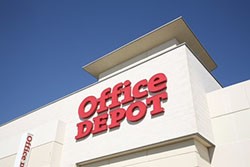Office Depot Scams Customers with a Fake "PC Health Check Program"
 A $25M fine has been imposed by the FTC to the office supplies retailer Office Depot for defrauding customers with fake malware removal services. The fraud has been conducted in partnership with Support.com which has fined as well, though with a smaller amount of $10M. The two companies worked together in charging their customers a total of $300M for the questionable malware removal services. FTC states that customers affected by the Office Depot scam will be refunded with funds coming from the total fine of $35M that has been imposed on Office Depot and Support.com.
A $25M fine has been imposed by the FTC to the office supplies retailer Office Depot for defrauding customers with fake malware removal services. The fraud has been conducted in partnership with Support.com which has fined as well, though with a smaller amount of $10M. The two companies worked together in charging their customers a total of $300M for the questionable malware removal services. FTC states that customers affected by the Office Depot scam will be refunded with funds coming from the total fine of $35M that has been imposed on Office Depot and Support.com.
The fraudulent scheme blew out in 2016 when an investigation by KIRO 7 in Seattle found out that the tool sold by Office Deport "detected" malware on computers that were brand new and surely did not have any malware infections. At that time, technicians at multiple Office Deport locations pushed members of the TV crew to buy malware removal software for $180, insisting that it is the company's requirement to run the utility on every single PC that came into the store. Remarkably, the upper management of the retailer did not seem interested in the many reports by its own technicians who stated that the anti-malware program is completely useless. In other cases, employees of Office Depot even complained internally that they had been pushed to lie to customers regarding the qualities of the fake software product.
The malware removal service was provided by Support.com in the period between 2009 and 2016 under the name "PC Health Check Program". The tool claimed to be a computer hardware diagnostic application, however, actually its only purpose was to persuade Office Depot customers to purchase the fake malware removal services. The app simulated to have detected various infections on a computer while, according to the FTC, it was technically not capable of identifying such malware threats. Thus, instead of performing a real PC security scan, the utility displayed a dialog box with a list of four general issues whereby the customers were asked to check the issue that they had with their computer. It was sufficient for the user to check any of the boxes for the anti-malware utility to generate a deceptive report claiming that infections were detected on the user's computer and that certain repairs were required. The four listed issues are very general and could be a symptom of various other hardware or software problems different than a malware infection:
- "Frequent pop-ups or other problems prevent me from browsing the internet."
- "My PC recently became much slower or is too slow to use."
- "I am often warned of a virus infection, or I am asked to pay for virus removal."
- "My PC frequently crashes."
It looks like Office Depot and its partner have relied merely on the lack of user education by employing the strategy described above and trying to extract money from such low-knowledge customers. It is not hard to realize that not all of the listed issued can be directly linked to the presence of a malware infection on a computer. A PC that crashes or is too slow to use could be simply an old machine, not to mention that these issues can be caused by virtually any kind of problem. The third issue - the constant flow of security warnings could also be just a part of Office Deport's strategy to convince inexperienced users to purchase the unnecessary malware removal services of the company and its partner. Furthermore, the fake utility also conveniently suggested to users a remedy that is well-known, but that would erase any proof that the system did not have a malware infection - the reinstallation of the entire operating system.